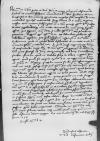Domini palatini ⌊Marieburgensis⌋ et ⌊Pomeraniae⌋ gratanter amplexi sunt consilium de intermittendis comitiis autumnalibus. Itaque litteras ad ⌊serenissimam maiestatem regiam⌋ nostra trium manu subscriptas, ac a vestra quoque Reverendissima Dominatione subscribendas sigillandasque nunc mitto. Nuntius hic meum quoque sigillum affert, quo signari etiam litterae, si modo Reverendissimae Dominationi Vestrae placebunt, poterunt. Dignetur igitur Reverendissima Dominatio Vestra, ut liberaliter pollicita est, tabellarium expedire, per quem tempestivum responsum a ⌊regia maiestate⌋ habeamus, quod ad ceteros dominos consiliarios et civitates ante diem conventus solitum mittendum erit. Si quid deest argumento litterarum ad persuadendum ⌊regiae maiestati⌋ Dominatio Vestra Reverendissima non gravetur id addere in litteris, quas fortasse ad dominum ⌊Matzeiowski⌋ vel dominum cancellarium scribet. Fuit hic apud me nobilis Felix de Alden negotium suum agens, quod quale sit, accipiet Reverendissima Dominatio Vestra ex argumento litterarum ad ⌊maiestatem regiam⌋ conceptarum, quas hic meus scriba secum affert. Rogavit autem me, ut se ipsamque causam suam Reverendissimae Dominationi Vestrae commendarem, quo una macum apud ⌊regiam maiestatem⌋ intercessor esse dignaretur. Quod homini vestrae libenter ipsi servituro negare ne velit, precor. Mitto itaque litteras commendaticias ad ⌊maiestatem regiam⌋, quarum priores cur mihi singulares fecerim, ipsis lectis Reverendissima Dominatio Vestra intelliget. Alteras communes et a me iam subscriptas, si vestro iudicio probabuntur, dignabitur Vestra Reverendissima Dominatio et ipsa subscribere, ac v amborum sigillis obsignatas una cum meis singularibus tabellario suo tradere perferendas. Sin in aliam formam recudendae videbuntur, hic meus nuntius rescribet, et sufficiet signum meum vestro additum. Accepi tunicellam cum Dalmatica{m} dono mihi missam a Reverendissima Dominatione Vestra, cuius ut in me beneficia cumulantur, ita sciero me debito cumulatiori teneri. Nunc, quod possum, gratias habeo maximas. Commendo me Reverendissimae Dominationi Vestrae, quam cupio feliciter valere atque multam aetatem in ea, quam nunc sibi confirmat ditione, exigere.


 AAWO, AB, D. 2, f. 100V
AAWO, AB, D. 2, f. 100V